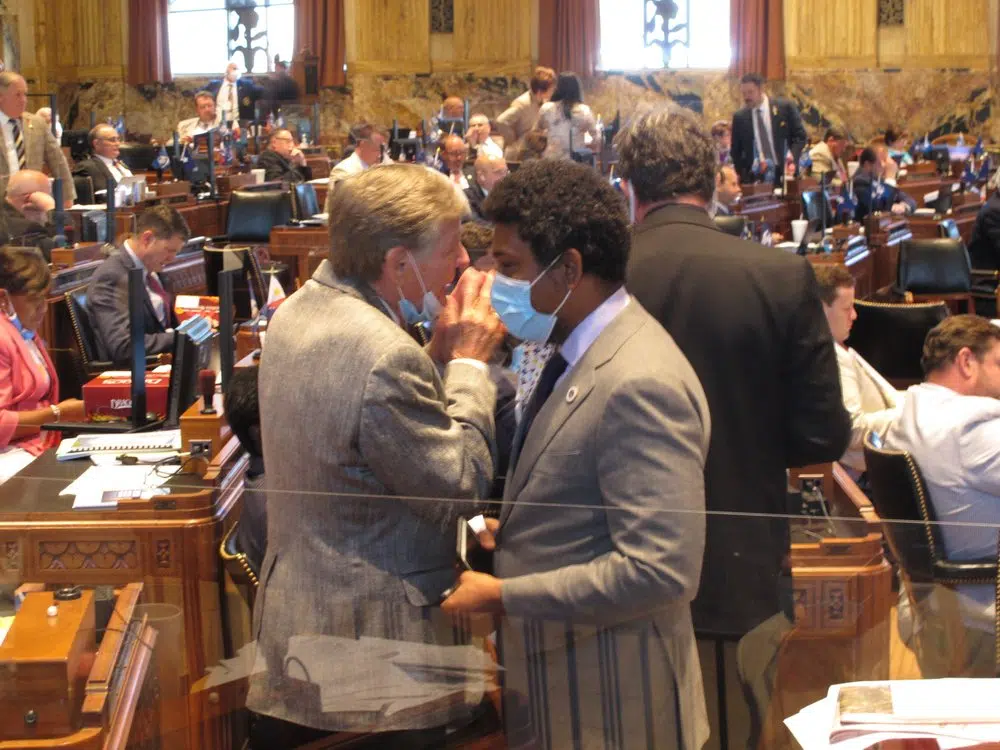BATON ROUGE, La. (AP) — Wrapping up a shortened regular session interrupted by the coronavirus pandemic, Louisiana lawmakers were poised Monday to hand business groups the limits on car wreck lawsuits that they’ve sought for years while punting completion of next year’s budget to another session.
The House and Senate must adjourn by 6 p.m. But they planned to open a 30-day special session immediately after that, to finish work on a $30 billion-plus spending plan for the financial year that begins July 1 and to consider tax breaks for businesses struggling amid the virus outbreak.
The regular session temporarily adjourned on March 16, a week after it began and a week after Louisiana’s first positive test for the COVID-19 disease caused by the coronavirus. Republican Rep. Reggie Bagala, a freshman legislator from Lafourche Parish, died before the House and Senate resumed their work.
Lawmakers returned on May 4 and crammed in debate on hundreds of bills into a four-week span, with fewer lobbyists, advocacy groups and members of the general public attending debates because of virus fears.
Legislators agreed to expand Louisiana’s medical marijuana program to cover any condition doctors want to treat with cannabis. They decided to let voters in the November election determine whether parishes should legalize sports betting. They loosened restrictions on carrying guns in church. And they voted to shield businesses from most lawsuits related to coronavirus injuries, unless someone can prove the high legal standard of “gross negligence or willful misconduct.”
Still outstanding Monday was a decision on $811 million in federal COVID-19 aid that Edwards wanted to steer to local government agencies for virus-related expenses. Republican lawmakers wanted to carve out $300 million for small business grants.
“Small businesses, their morale is low. They don’t know if they’re going to survive,” said Republican Sen. Heather Cloud, of Turkey Creek.
In addition to grants, the Legislature was readying to give the business lobby a long-desired goal that Republicans made their signature push for the session: passage of a bill to change the rules for car accident lawsuits that would limit damage claims against insurance companies and other businesses.
Both the House and Senate backed the “tort reform” measure by Republican Sen. Kirk Talbot of River Ridge. GOP leaders were meeting behind the scenes with Gov. John Bel Edwards trying to keep the Democratic governor from vetoing the bill.
“We are in negotiations with the governor to find some common ground,” Talbot said.
Supporters say reworking the civil litigation system — to cap certain damages that could be awarded and limit when insurance companies can be sued directly, among other changes — would force down Louisiana’s car insurance rates, which are second-highest in the nation. They say Louisiana’s legal climate encourages too many lawsuits.
Opponents say the changes would keep people from getting money needed to cover their medical bills and could drive up costs for courts. They note the bill doesn’t force insurance companies to lower premiums.
The proposal passed with veto-proof, two-thirds majorities in each chamber. But veto overrides are rare in Louisiana, and some Republicans would rather avoid the fight if possible. A final version of Talbot’s bill must win House and Senate votes before reaching the governor’s desk.
In another strike at personal injury lawyers, lawmakers sought to rein in the proliferation of TV, radio and billboard ads from lawyers promising big paydays by suing businesses. Cloud’s bill won final passage Monday. The measure would declare as false or misleading lawyer ads in which a person claims to have received the full amount of a settlement or judgment, without disclosing the money deducted for attorney fees and court costs. The ads could be prosecuted as an unfair trade practice.
While business lobbyists were winning on several measures, oil and gas lost one of its chief aims of the session, a bid to retroactively nullify the lawsuits that parishes have filed against the industry for damage caused to coastal wetlands. The bill ran into criticism from Jefferson and St. Bernard parish leaders, environmentalists and coastal restoration advocates and stalled.









Comments